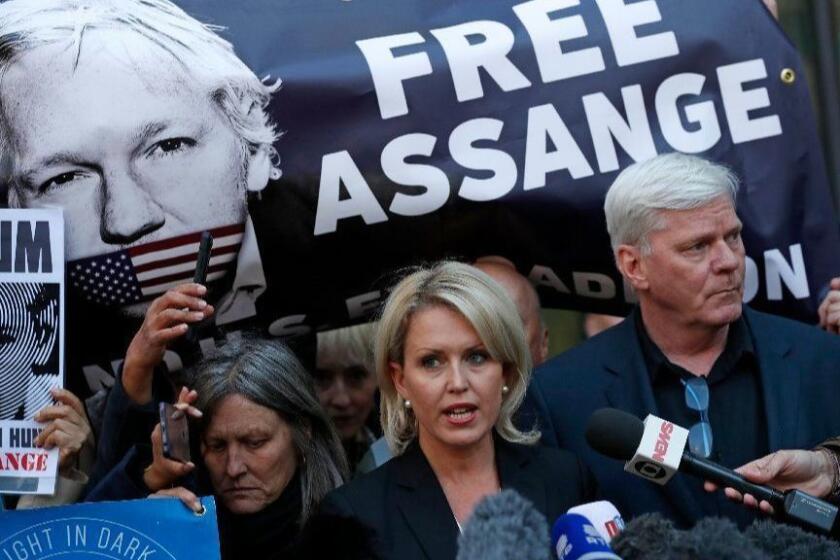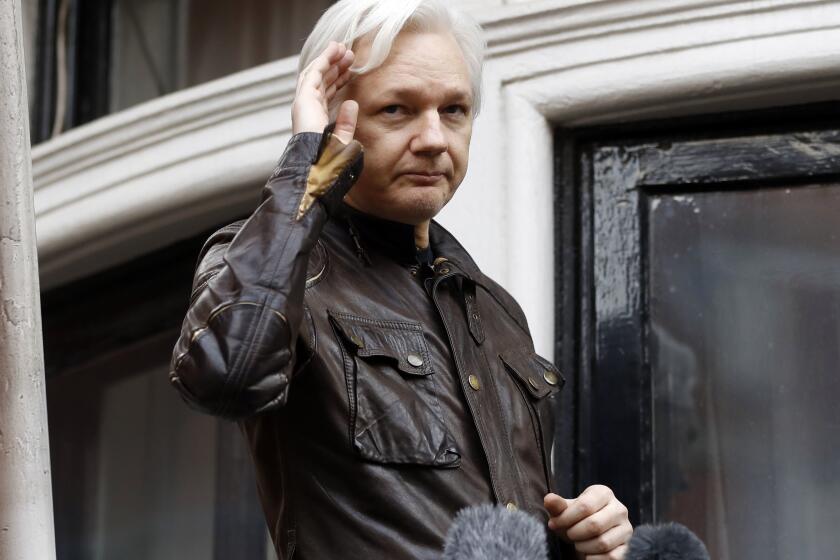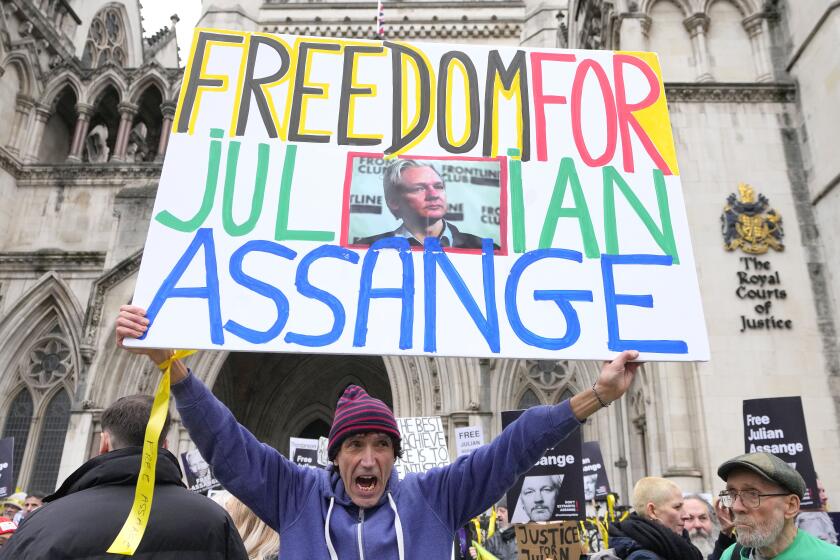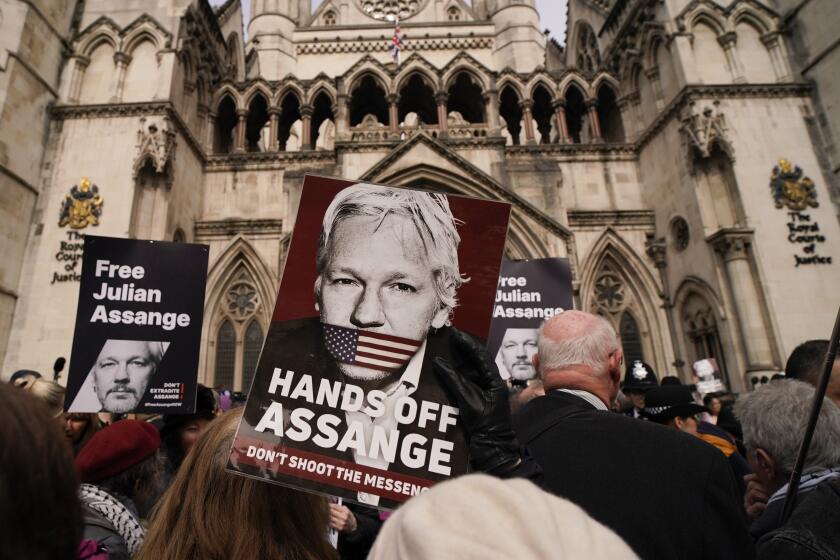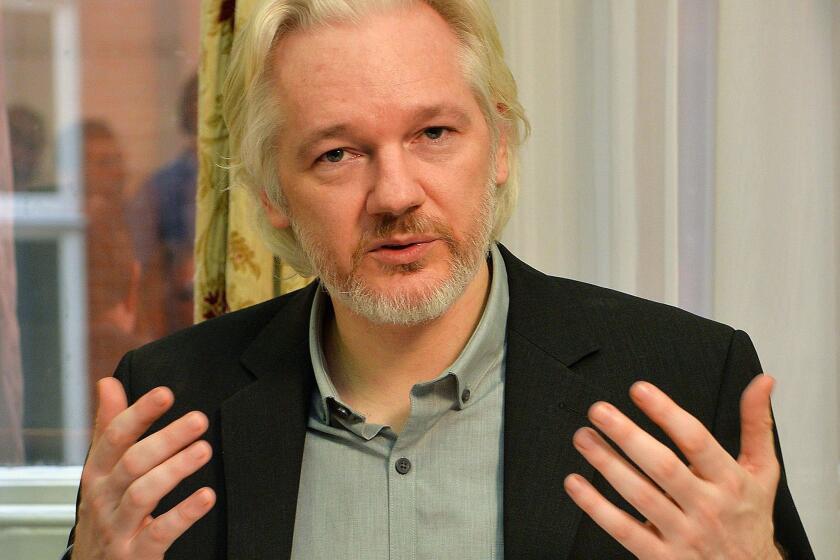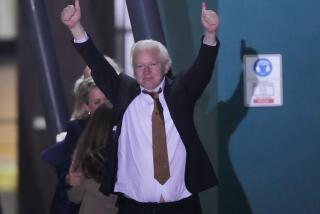WikiLeaks’ Assange pleads guilty in deal with U.S. that secures his freedom, ends legal fight
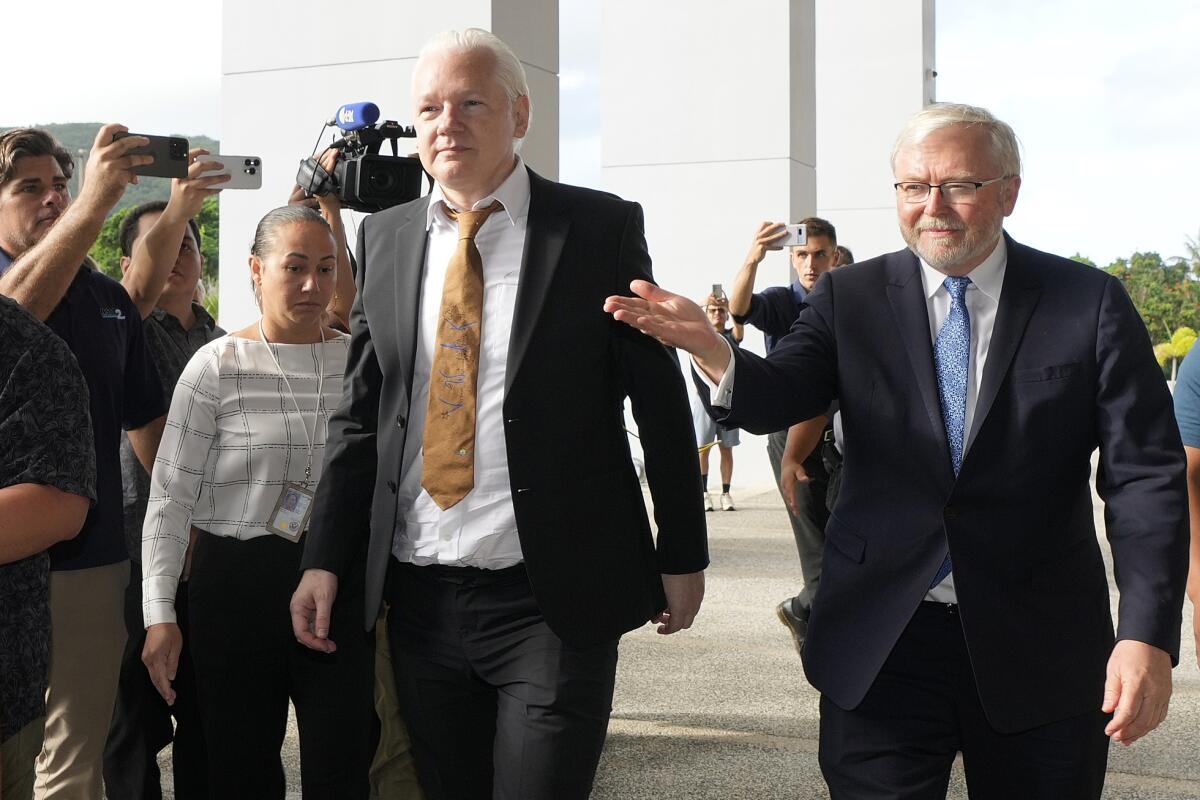
SAIPAN, Northern Mariana Islands — WikiLeaks founder Julian Assange has pleaded guilty to a single felony charge for publishing U.S. military secrets in a deal with Justice Department prosecutors that secures his freedom and concludes a drawn-out legal saga that raised divisive questions about press freedom and national security.
The plea was entered Wednesday morning in federal court in Saipan, the capital of the Northern Mariana Islands, a U.S. commonwealth in the Pacific. He arrived at court shortly before the hearing was to begin, wearing a dark suit with a tie loosened at the collar, and entered the building without taking questions.
Though the deal with prosecutors required him to admit guilt to a single felony count, it would also permit him to return to his native Australia without spending any time in an American prison. He had been jailed in the United Kingdom for the last five years, fighting extradition to the United States on an Espionage Act indictment that could have carried a lengthy prison sentence in the event of a conviction.
The hearing is the stunning culmination of the U.S. government’s yearslong pursuit of the publisher, who has been painted both as a hero and a reckless criminal for exposing hundreds of thousands of sensitive military documents.
With his shock of Warhol-white hair, black leather jacket and self-proclaimed mission to lay bare official malfeasance, Australian-born Julian Assange burst onto the world stage more than a decade ago with his creation of the WikiLeaks website.
The U.S. Justice Department agreed to hold the hearing on the remote island because Assange opposed coming to the continental U.S. and because it’s near Australia.
The deal — disclosed Monday night in court papers — represents the final chapter in a more than decade-long legal odyssey over the fate of Assange, whose hugely popular secret-sharing website made him a cause celebre among press freedom advocates who said he acted as a journalist to expose U.S. military wrongdoing. U.S. prosecutors have said his actions recklessly put the country’s national security at risk.
He will get credit for the five years he has already spent in a high-security British prison while fighting extradition. Before being locked up in London, Assange spent years hiding out in the Ecuadorean Embassy in London to avoid extradition to Sweden to face allegations of rape and sexual assault, which he has denied.
The British government has ordered the extradition of WikiLeaks founder Julian Assange to the United States to face spying charges.
The abrupt conclusion enables both sides to claim a degree of success, with the Justice Department able to resolve without trial a case that raised thorny legal issues and that might never have reached a jury at all given the plodding pace of the extradition process.
Last month, Assange won the right to appeal an extradition order after his lawyers argued that the U.S. government provided “blatantly inadequate” assurances that he would have the same free speech protections as an American citizen if extradited from Britain.
His wife, Stella Assange, told the BBC from Australia that it had been “touch and go” over 72 hours whether the deal would go ahead but she felt “elated” at the news. A lawyer who married the WikiLeaks founder in prison in 2022, she said details of the agreement would be made public once the judge had signed off on it.
Julian Assange’s lawyers have begun their final U.K. legal challenge to stop the WikiLeaks founder from being sent to the United States for trial.
“He will be a free man once it is signed off by a judge,” she said, adding that she still didn’t think it was real.
Assange on Monday left the London prison, where he has spent the last five years, after being granted bail during a secret hearing last week. He boarded a plane that landed hours later in Bangkok to refuel before taking off again toward Saipan. A video posted by WikiLeaks on X showed Assange staring intently out the window at the blue sky as the plane headed toward the island.
“Imagine. From over 5 years in a small cell in a maximum security prison. Nearly 14 years detained in the UK. To this,” the post said. The top Australian diplomat in the United Kingdom accompanied Assange on the flight.
The guilty plea resolves a criminal case brought by President Trump’s administration over the receipt and publication of war logs and diplomatic cables that detailed U.S. military action in Iraq and Afghanistan. Prosecutors alleged that Assange conspired with former Army intelligence analyst Chelsea Manning to obtain the records and published them without regard to American national security, including by releasing the names of sources who provided information to U.S. forces.
The court says Julian Assange can’t be extradited to the U.S. on espionage charges unless U.S. authorities guarantee he won’t get the death penalty.
Former Vice President Mike Pence called the new arrangement a “miscarriage of justice,” writing on X that Assange “endangered the lives of our troops in a time of war and should have been prosecuted to the fullest extent of the law.”
But Assange’s activities drew an outpouring of support from press freedom advocates, who heralded his role in bringing to light military conduct that might otherwise have been concealed from view. Among the files published by WikiLeaks was a video of a 2007 Apache helicopter attack by American forces in Baghdad that killed 11 people, including two Reuters journalists.
Australia for years has been calling on the U.S. government to drop the case against Assange, arguing there’s a disconnect between the treatment of Assange and Manning. Then-President Obama commuted Manning’s 35-year sentence to seven years, which allowed her release in 2017.
A British judge has denied bail for WikiLeaks founder Julian Assange, who has been jailed since 2019 as he fights extradition to the United States.
“Regardless of the views that people have about Mr. Assange’s activities, the case has dragged on for too long,” said Australian Prime Minister Anthony Albanese. “There’s nothing to be gained by his continued incarceration and we want him brought home to Australia.”
Assange took refuge in the Ecuadorean Embassy in London in 2012 and was granted political asylum after courts in England ruled he should be extradited to Sweden as part of a rape investigation in the Scandinavian country. He was arrested by British police after Ecuador’s government withdrew his asylum status in 2019 and then jailed for skipping bail when he first took shelter in the embassy.
Britain’s top court has refused WikiLeaks founder Julian Assange permission to appeal a decision to extradite him to the U.S. to face spying charges.
Although Sweden eventually dropped its sex crimes investigation because so much time had elapsed, Assange had remained in London’s high-security Belmarsh Prison during the extradition fight with the U.S.
Assange made headlines again in 2016 after his website published Democratic emails that prosecutors say were stolen by Russian intelligence operatives. He was never charged in special counsel Robert Mueller’s Russia investigation, but the inquiry laid bare in stark detail the role that the hacking operation played in interfering in that year’s election on behalf of Trump.
Yamaguchi, Esmores, Durkin Richer and Tucker write for the Associated Press. Tucker reported from Fort Pierce, Fla., and Durkin Richer from Washington. AP writers Colleen Long in Washington, Napat Kongsawad and David Rising in Bangkok, Jill Lawless and Brian Melley in London and Rod McGuirk in Melbourne, Australia, contributed to this report.
More to Read
Sign up for Essential California
The most important California stories and recommendations in your inbox every morning.
You may occasionally receive promotional content from the Los Angeles Times.
